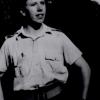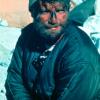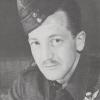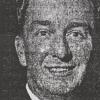This is the story, as far as it can be told at present, of the private war carried out by the 1st Airborne Division from its landing at TARANTO on the 9th September until the war became organized under 8th Army towards the end of September, after which it was no place for us.
The first news of the project was vouchsafed on the 4th September when the Divisional Commander[i] flew to Sicily, taking me with him and there attended a conference presided over by General Alexander, and attended by certain Italian representatives, who promised assistance to any British forces landed at TARANTO. This of course was five days before the Armistice.
The only means of getting troops to TARANTO was by cruiser, as all available craft were engaged in the forthcoming SALERNO operations and we were promised six, which, by making two trips, could transfer the effective part of the Division (about 6,000 all ranks) within 72 hours, but only with a very small number of light vehicles and anti-tank guns, and reduced services.
We returned to North Africa that evening with very little concrete information on which to base a plan, but with the necessity of moving the Division 150 miles to BIZERTA[ii] so as the first flight would be ready to embark on the 8th.
Intelligence suggested that the Germans were not in any strength in APULIA, and those that were there consisted of the 1st Parachute Division, still weakened from the fighting in SICILY; but we had no means of assessing their reactions to our occupation of an area which not only gave the Navy a first class base, (TARANTO), but also gave us control of the Adriatic, easy access to the Balkans, and airfields which cut down the range to Southern Germany, Hungary and Rumania by at least one half.
Embarkation went more or less according to plan and the Navy seemed to regard it as a point of honour that nothing on the quay should be left behind. The cruisers decks were littered, incredibly with jeeps, anti-tank guns, motor-cycles, folding bicycles, boxes of ammunition, rations, signal equipment, as well as the personal equipment of the troops.
At 17.00 hours, 8th September we sailed from BIZERTA, five cruisers and one fleet minelayer[iii] in line astern, with Commodore Agnew’s flag flying in the flagship. We had an uneventful voyage, during the course of which we heard on the wireless of the Armistice, and the morning of the 9th September found us steaming northwards up the Eastern side of the “toe” with two of the Navy’s newest battleships as escort and a respectable force of destroyers. The whole force was a magnificent sight as it steamed on at 25 knots, and one I shall never forget. One’s other thoughts were interesting too. Here we were, in sight of territory still occupied by the Germans, making for a port which up to that time had been the main Italian naval base, poorly as they had used it, and the scene of one of the most successful naval air operations of the war.
Soon after 14.00 hours we reduced speed as we were approaching minefields covering TARANTO, and had to wait for an Italian pilot, which had been promised, but who had failed to materialise. While a destroyer went in to fetch him we cruised slowly in the bay, and watched, hull down on the horizon, the units of the Italian fleet based at TARANTO, stealing away to MALTA.
At about 16.30 hours the destroyer returned complete with pilot, and we steamed into the outer harbour, led by one of the battleships, in case of any nonsense. As we entered a Junkers 52, the last of the Germans flew away from an airfield nearby, followed rather hesitatingly by Italian A.A. fire.
At about 20.00 hours Admiral Power, commanding the battle squadron came aboard Commodore Agnew’s flagship and in the presence of General Hopkinson and myself, received the Italian Admiral commanding the TARANTO garrison.
Meanwhile disembarkation was going on. The leading troops ashore moved out on the roads running northwest and north to gain contact with the Germans, while other parties went to gain touch with the police, the railway and medical authorities and the port. In all this we were handicapped in not knowing the terms of the Armistice or the official line to be taken with the Italians, who themselves spoke of collaboration while we preferred to regard them as a defeated nation, desperately trying to save something from the wreck.
After the conversations with the Italian Admiral, General Hopkinson and myself transferred to an American cruiser where an interview had been arranged with the local military commanders, and at which various questions were discussed concerning Italian troop dispositions, their intentions should any Germans appear (these we could guess) and the ever burning question of transport, to augment our slender resources.
It should be remarked that we had nothing except the normal divisional organization, pruned at that, and yet were faced with the problem of being the sole British Force in the area for a period of at least a fortnight. We had therefore to organize a miniature port organization and Base, work the railway, man hospitals for an unforeseeable number of casualties, and until the arrival of General Mason MacFarlane, head of the British Military Mission, carry out all political contacts, though this latter was simplified by the fact that Italy being under martial law, all approaches could be made through military channels.
The landing was marred by the sinking of one of H.M. ships[iv] in the harbour, as a result of a mine explosion, and there was regrettable loss of life, the loss of the greater part of our ammunition reserve and all of our anti-tank guns.
This caused some anxiety, for there was no chance of replacing any of this material until the arrival of the cruisers on the second lift, now reduced to five, and it imposed a more cautious policy on us than we cared for, as we could not risk provoking a major clash until our ammunition supply was secure.
It appears that the Germans had never occupied TARANTO in any strength, and they started to evacuate it some 24 hours before we arrived. In fact our first headquarters was practically handed over to us by them, and was littered with their notices and papers.
Our patrols made contact with weak enemy rearguards south of MASSAFRA, and about twelve miles from TARANTO on the BARI road, and during 10th September we developed an attack against MOTTOLA, five or six miles beyond and in a dominating position if there ever was one, and drove the enemy, about a company strong, out of it.
Simultaneously we developed another movement north westwards through PALAGIANO on to CASTELLANETA and it was in the fight for this town on the 11th September, that General Hopkinson received the wound from which he died 36 hours later.[v]
Meanwhile in TARANTO work had been proceeding in getting to grips with the base organization. One of the first problems to be tackled was the requisitioning of vehicles, and we soon found that tese were extremely scarce. At the start requisitioning was wholesale and somewhat indiscriminate, with the result that among the vehicles collected were a fire engine, the technical vehicle on which apparently (to judge by the fuss made) the TARANTO water supply depended, and the Archbishops car, which might have caused strained relations with the Vatican if it had not been promptly returned.
TARANTO began as a dead city, the bulk of the population having been evacuated into the surrounding country on account of air raids, but as we proved ourselves to be reasonable human beings from whom nothing more terrible than an occasional intoxicated soldier was to be feared, the town began to return to life, and soon a brisk trade was going on which started with prices ridiculously cheap, owing to the more than favourable rate of exchange, but soon obeyed the economic laws of the influence of supply and demand on price.
It was now that the Italians discovered a fascinating game that they could play on us without the slightest fear of any consequences. The town of TARANTO is divided by a canal which joins the outer and inner harbour, and over the canal is a swing bridge, which carries all traffic from TARANTO to the North and northwest. When opened to allow the passage of vessels between the two harbours, all traffic is at once suspended. The swing bridge game never palled, and was the cause of many missed appointments as the hours of opening were quite unpredictable.
At the front we were now established between MOTTOLA and GIOIA-DEL-COLLE, whose airfield was still in German hands, and at CASTELLANETA.
The flimsy state of our communications and reserves forbade further progress for the present and it seems that by going so far we had perhaps deluded the Germans into over-estimating our strength. Be that as it may, they never showed any tendency but to withdraw in front of us, and even the usual counter-attacks did not take place. Had we been more mobile we could have interfered seriously with their timetable, but as it was we had to rest content with patrol activity, and left the Germans to carry out their programme according to plan.
Meanwhile our reconnaissance patrols[vi] had been working round, through and behind the enemy. They entered BARI the day after we landed, and found no Germans, but those painted by the imagination of the Italians. These patrols had necessarily to reply on Italian reports, and we soon discovered the factor by which all their estimates should be divided, which was about ten. Many Italian soldiers came to us thirsting for vengeance against the hated Germans (which we were to take on their behalf), having been overpowered and disarmed by them. Investigation usually showed that it took about at least ten Germans to disarm as few as a hundred fully armed Italians.
It was not without anxiety that we watched the progress of operations on the SALERNO front. The 8th Army were still a long way down the “toe” and would of course be making for SALERNO rather than for us, and if SALERNO failed, as at one time it seemed to us it might, we wondered how soon it would be before powerful German Forces started paying us attention. However, the Germans continued to ignore the indignities we committed against the tough and not very sensitive part of his hide opposed to us, and soon we GIOIA airfield in our hands, worked by the R.A.F., and had begun to run a daily pack-train to a railhead in the immediate rear of our forward troops. Hospitals were being organized and the A.D.M.S. said that the Italian medical equipment was amongst the best to be found anywhere and their doctors among the worst. Their schools built on a lavish scale by Mussolini, made first class hospitals, and were probably designed for this alternative use in time of war. Casualties from battle were not heavy, but malaria and sand-fly began to take their toll.
At this time too we had the excitement of being placed on half-rations, but this only lasted for a day and was no handicap in a country so abounding in grapes, chickens, sheep and pigs as that in which we found ourselves.
All this time advanced parties of the Base, Corps Headquarters, Military Mission and Naval and Air Staffs kept on coming in. They all came with no administrative element or any transport, and expected us to do it for them, and they never really believed our statements as to the very small number of vehicles in our possession.
On the 18th September General Allfey arrived, the commander of the Corps[vii] that was to come into our part of the world. He did not interfere in our operations, which had now reached the limit to which they could be supplied, but by degrees General Vivian Eveleigh’s division[viii] made its appearance and our reign was over.
The whole operation would have been an unqualified success, but for the two tragedies, the loss of the minelayer and the death of General Hopkinson. It gave the 1st Airborne Division the opportunity of shaking itself out as an operating division and services benefitted enormously.
[i] Major-General G.F. Hopkinson [ii] The 1st Airborne Division was then encamped in the olive groves astride the SOUSSE – KAIROUAN road. It had in its Order of Battle: 1st Parachute Brigade (Brigadier Lathbury) 2nd Parachute Brigade (Brigadier Down) 4th Parachute Brigade (Brigadier Hackett) Airlanding Brigade (Brigadier Hicks) [iii] Cruisers: H.M.S. Galatea, Penelope, Orion and Sirius; U.S.S. Boise. Fleet minelayer: H.M.S. Abdiel. [iv]H.M.S. Abdiel. The 6th (Royal Welsh Fusiliers) Parachute Battalion suffered heavy casualties. [v] Brigadier E.E. Down then took over command of the division. [vi] These included detachments from the G.H.Q. Special Reconnaissance unit and Popski’s Private Army, and Divisional Headquarters had little control over them, except when they wanted something. [vii] 5th Corps. [viii]78th (Battleaxe) Infantry Division
Compiled by Bob Hilton
Read More




Latest Comments
There are currently no comments for this content.
Add Comment
In order to add comments you must be registered with ParaData.
If you are currently a ParaData member please login.
If you are not currently a ParaData member but wish to get involved please register.